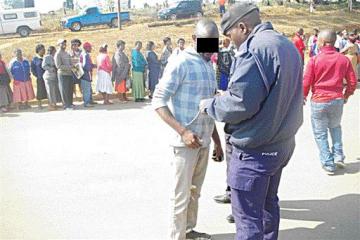Cops nab campaigning agent
 The man being questioned by a police officer.
The man being questioned by a police officer.
PIGG’S PEAK – There was near chaos in Pigg’s Peak when a man was briefly detained by the police for allegedly canvassing for votes on behalf of a candidate who aspires to be a Member of Parliament (MP).
The man, who is a registered agent of the aspiring MP, was found with a picture of the latter.
He allegedly used the male candidate’s picture to show to voters, urging them to cast their votes in the latter’s favour.
This happened at around 9am yesterday, a few hours after voting began.
There was a scene when displeased voters called police officers who were on site and reported him.
As he was questioned, some voters jeered and told the police to remove him from the area. The police then took him with them, apparently to the police station. It was not immediately clear if he was later charged with any crime or released.
When the candidate was interviewed on the issue, he denied knowing the man, saying he was not involved in any way with the issue.
Tulujane Sikhondze, the Presiding Officer for the centre was also interviewed.
He said the incident had not been reported to him yet.
He also said the police would act on the issue and if found to have digressed, the man will be arrested.
Elections for the constituency began in earnest at about 7am.
People were transported to the Gobolondlo polling station on buses, trucks and private cars, which were mostly said to have been provided for by candidates who were vying for the MP position.
Over 4 000 people lined up to vote in Pigg’s Peak yesterday under an atmosphere that was filled with tension.
Three prominent candidates at the Pigg’s Peak polling station and arguably for the constituency, Hlobisile Ndlovu, former MP, Jabulani Mabuza and Dumisile Ndlovu (related to Hlobisile) were pitted against each other for the Member of Parliament position.
The candidates freely went around the polling station as voters stood in long queues for a chance to vote.
Campaigning behind the scenes, in fear of the police, was the order of the day.
The Pigg’s Peak elections lived up to its billing of being controversial as there were sporadic incidents from rival teams, leading campaigns and manhandling each other but the presence of the police calmed the morning session of the voting process which remained peaceful.
The elections proved to be popular, such that people started cramming the town council hall from 6am.
By 7am over 2 000 people had already crammed and queued to vote near the town council building. It would seem that the three candidates and their support teams had done their home- work as people who were interviewed indicated that they were clear about the candidates they would vote for. Hlobisile stood out in her colourful dress code, with a jacket similar to those worn by safety officers. Mabuza wore a black blazer with formal black trousers and a blue shirt.
Dumisile had on a black suit dress which she complemented with a black hat.
In the morning, the elections proceeded with minor incidents as the police, who were all over the premises, made sure there was peace and order.
Pigg’s Peak Magistrate Simangele Mbatha was spotted moving up and down, issuing orders and also making sure the voting exercise went smooth. She was the presiding officer.
Three lines were then created to also accommodate the elderly and people living with disabilities, those who were rushing to work and other voters.
By noon, there were over 3 000 people who were still lined up to vote.
The line to the voting polling station was slow owing to the fact that each voter had to undergo a number of stages which were all centred on verification of the voter. This process proved to be lengthy.
The morning session was peaceful save for some few incidents which were calmed by the police.
These came about partly because there were voters who appeared intoxicated.
They were also a few individuals who were wearing t-shirts bearing campaign slogans of some candidates. They were, however, not disturbed by the police.
What should be noted is the fact that campaigning was prohibited at this voting stage.
Candidates seemingly adhered to this arrangement because they were mostly confined inside the polling centre and mingled less with voters and their campaign teams were not visible.
When interviewed collectively, the main candidates were individually hopeful that they would win the elections.
They said they had done their part encouraging voters to vote for them and were eagerly awaiting results which would take them to the secondary elections on September 20, 2013.




 del.icio.us
del.icio.us Digg
Digg